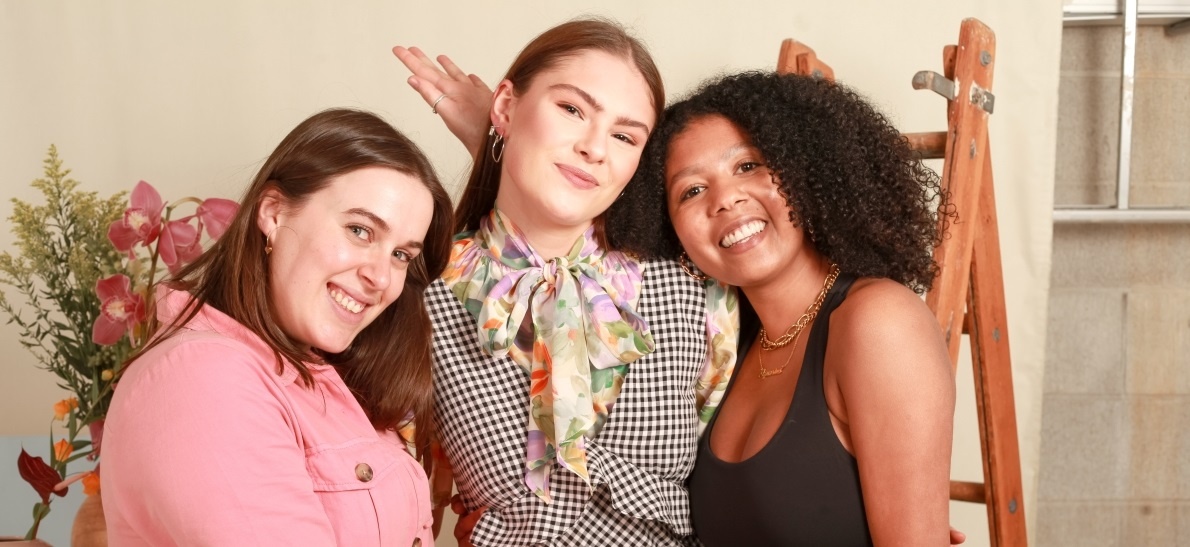Emily Miller-Sharma is transforming the fabric of Auckland’s fashion industry, using the threads of sustainability and collaboration.
A maker by trade, with a lifetime connection to fashion and sewing through her family, Emily is General Manager of Auckland fashion label RUBY and designer for Liam. Purchased by the Sharma family in 2008, RUBY now has six bricks and mortar stores across New Zealand and an online store, shipping worldwide.
A passionate advocate for the local industry, its people and sustainable business practices, Emily is excited about the future of fashion in Auckland and effecting meaningful change.
Auckland has so many people that are dedicated to the craft of making clothes and are aware of what needs to happen to make the industry more sustainable. We're a strong network of people and I can't wait to see what happens.
Emily says while the impact of COVID-19 presented many uncertainties for RUBY, it also enabled creativity and confidence to thrive at pace.
“Once we had the certainty of the initial lockdown, the team supported each other to push forward with ideas that would usually have taken months to flesh out. Instead, we would suggest something and maybe by the end of the week or the beginning of the week after, we would have launched it.”
A more circular approach to business – which designs out waste and pollution, keeps products and materials in use and regenerates natural systems – is a central consideration for Emily and the team at RUBY.
Recognising business would be challenging for some time, Emily worked through the New Zealand-wide lockdown to prepare RUBY for the future by prioritising more sustainable and circular business practices. Some fabric orders were repurposed, plans to provide patterns and fabric for sale were accelerated, and Emily held online sewing lessons for customers.
“We had done work at a circularity workshop through ATEED and one of the things that had come out of that was selling our patterns to our customers. During lockdown, we were able to give our customers the experience of making things while they were stuck at home, knowing in the back of our mind it was a really great pathway for us towards being a more circular business model.”
Throughout 2020, the team at RUBY has continued to innovate in a sustainable way. During Auckland’s Alert Level 3 lockdown, when wearing face masks was encouraged to help prevent community transmission of COVID-19, RUBY repurposed waste fabric to create face masks for sale in its online store.
“We are so stoked that masks are an effective way to slow or stop the spread of COVID-19, and since we need to be wearing them, we figure we may as well have fun with them!”
“The first batch of masks we released used production offcuts and ends of sampling rolls. Some complex mathematical equations were going on in our workroom to make sure we had enough ribbon to go with the fabric that had been cut. Our whole office felt a bit like my bedroom when I was at high school – an explosion of colour, fabric and trims.”
Emily says during the lockdowns, decision-making was fast-tracked, and the RUBY team became increasingly comfortable sharing the brand’s sustainability journey with customers.
A lot of clothing designers can be quite fearful to talk publicly about sustainability because it can be a meaningless term, or it can be a term which is used to greenwash. During lockdown, there wasn't any time for that kind of fear to come out and so we just went all in for us.
Emily’s passion for sustainability extends beyond the environment, to the sustainability of Auckland’s fashion industry itself. RUBY has opened its internal apprenticeship programme to the wider industry, to increase and renew the local skills base.
“The apprenticeship programme answers two questions – there’s a skills shortage in our fashion manufacturing industry and there’s also a lot of fabric waste. So, we're using our fabric offcuts as the training material in the apprenticeship workshops.”
Emily recognises the real need for collaboration to transform and grow the local industry in a sustainable way. In 2019 she founded the industry collective, Mindful Fashion New Zealand, with fellow designer Kate Sylvester. It aims to strengthen the local fashion and textile industry and benefit the wider community by promoting long-term sustainable growth through responsible business practice and industry investment.
“We know that we need to collaborate to make progress more quickly and I believe we have a group of designers, manufacturers and fabric suppliers here who are all passionate about this change. COVID-19 has helped us remove the shackles of fear about what is the right way of doing things and have more confidence in working together to create the future we know we need."
